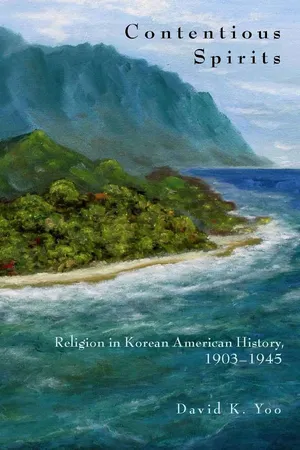1 The late Elder Whamok Lee (1898–1997) is featured in K. W. Lee, with Luke and Grace Kim, “Home Is Where the Soul Is,” KoreAm Journal 16, no. 2 (February 2005): 50–59. The account focuses on her son, Warren Lee, author of A Dream for South Central: The Autobiography of an Afro-Americanized Korean Christian Minister (Seoul, Korea: Christian Literature Society, 1994). In the article, Elder Lee’s name is spelled Hwa Mok Lee, but she used the spelling Whamok Lee.
2 That migration to this country has never been a uniform experience is made all too evident in the passage of the Naturalization Act of 1790, which limited citizenship to free whites—a restriction that was not fully removed for Asians until 1952. The Chinese Exclusion Act of 1882 also began a string of exclusionary measures aimed at multiple Asian groups that culminated in the 1924 Immigration Act. For overviews on Asian American history, see Sucheng Chan, Asian Americans: An Interpretive History (Boston: Twayne, 1991); and Ronald Takaki, Strangers from a Different Shore: A History of Asian Americans (Boston: Little, Brown, 1989). See also, Bill Ong Hing, Making and Remaking Asian America Through Immigration Policy, 1850–1990 (Stanford, CA: Stanford University Press, 1993).
3 As historian Sucheng Chan (Asian Americans, 145) points out, the 1965 Immigration Act, the 1975 Indochina Migration and Refugee Assistance Act, the 1980 Refugee Act, and the 1987 Amerasian Homecoming Act together created the legal structure surrounding the migration of Asians to the United States during the past forty years.
4 The figure of 1.5 million Korean Americans is based upon the 2006 estimate of the U.S. Census Bureau, published in the newsletter Facts for Features, Asian/Pacific American Heritage Month, March 3, 2008, p. 1 (http://www.census.gov/Press-Release/www/releases/archives/facts_for_features_special_editions/011602.html). For a general overview of Korean Americans, see Won Moo Hurh, The Korean Americans (Westport, CT: Greenwood Press, 1998).
5 Pei-te Lien and Tony Carnes, “The Religious Demography of Asian American Boundary Crossing,” in Tony Carnes and Fenggang Yang, eds., Asian American Religions: The Making and Remaking of Borders and Boundaries (New York: New York University Press, 2004), 48–49. Of the total figure (79 percent), Protestants accounted for 69 percent and Catholics 11 percent. The following are the percentages for the remaining categories: None (6 percent), Not Sure (1 percent), Other (3 percent), Refused to Answer (6 percent). The survey data for church attendance were for the New York City area. The directory listing of churches consisted of 3,402 Protestant churches, and a separate directory identified 154 Catholic parishes in the United States. Lien and Carnes cite Modern Buddhism, a Korean journal, for the figure of one hundred Buddhist temples in the United States.
6 The scholarship on Korean American religion continues to grow at a steady clip: David K. Yoo and Ruth H. Chung, eds., Religion and Spirituality in Korean America (Urbana: University of Illinois Press, 2008); Rebecca Y. Kim, God’s Whiz Kids: Korean American Evangelicals on Campus (New York: New York University Press, 2006); Elaine Howard Ecklund, Korean American Evangelicals: New Models of Civic Life (New York: Oxford University Press, 2006); Su Yon Pak et al., Singing the Lord’s Song in a New Land: Korean American Practices of Faith (Louisville, KY: Westminster John Knox Press, 2005); Sharon A. Suh, Being Buddhist in a Christian World: Gender and Community in a Korean American Temple (Seattle: University of Washington Press, 2004); Okyun Kwon, Buddhist and Protestant Korean Immigrants: Religious Beliefs and Socioeconomic Aspects of Life, The New Americans (New York: LFB Scholarly Publishing, 2003); Young Lee Hertig, Cultural Tug of War: The Korean Immigrant Family and Church in Transition (Nashville: Abingdon Press, 2001); Ho-Youn Kwon, Kwang Chung Kim, and R. Stephen Warner, eds., Korean Americans and Their Religions: Pilgrims and Missionaries from a Different Shore (University Park: Pennsylvania State University Press, 2001); Jung Ha Kim, Bridge-makers and Cross-bearers: Korean-American Women and the Church (Atlanta: Scholars Press, 1997); Victoria H. Kwon, Entrepreneurship and Religion: Korean Immigrants in Houston, Texas (New York: Garland, 1997); Ai Ra Kim, Women Struggling for a New Life: The Role of Religion in the Cultural Passage from Korea to America (Albany: State University of New York Press, 1996). Too numerous to mention are books that have significant content on Korean American religion as well as book chapters, journal articles, dissertations, and theses.
7 The literature on early Korean American history includes Warren Y. Kim, Koreans in America (Seoul: Po Chin Chai, 1971); Bong-Youn Choy, Koreans in America (Chicago: Nelson-Hall, 1979); Wayne Patterson, The Korean Frontier in America: Immigration to Hawai’i, 1896–191...




